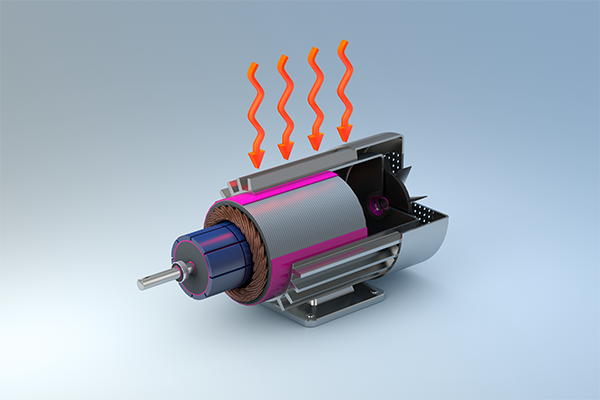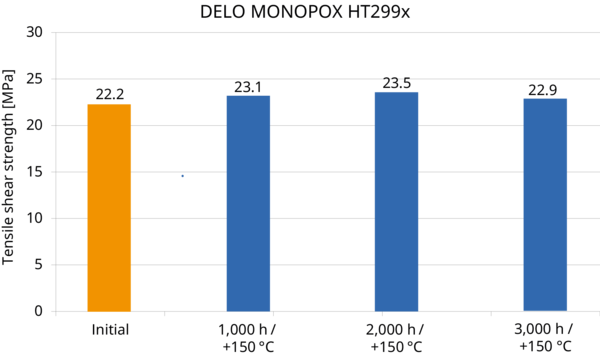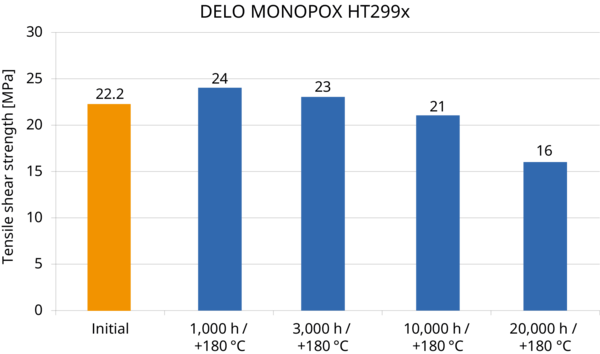The outstanding performance of DELO adhesives for electric motors has been proven once again: Even after intensive 20,000 hours of demanding testing under extreme temperatures, they retain their high strength - to our knowledge, no one has ever attempted this before.
Adhesives play an increasingly significant role in the manufacture of many modern products, so you want to make sure you choose precisely the right adhesive for your use case. In an effort to make this decision easier, we at DELO put all our products through rigorous testing. We always want to understand and develop our products further, often venturing into unknown areas of research.
One often crucial factor to consider when assessing our adhesives is resistance to extreme temperature. As adhesives are essentially plastics, while they do not necessarily melt in intense heat, they do lose some of their strength. Therefore, you will find adhesives that are up to the conditions of the intended application.
In the case of electric motors used in EVs, adhesives should be able to withstand high temperatures over the course thousands of operating hours, given the heat generated by motor operation. One series of durability tests we administer at DELO is exposing many of one particular substrate each fixated by a different adhesive, to varying levels of extreme heat for varying amounts of time, afterwards measuring its strength—more specifically, the tensile shear strength of two bonded steel specimens.
Our goal with these temperature resistance tests was to see how long the bond of our ten most heat-resistant adhesives could survive extreme temperatures likely to be seen in real-life situations.
One of the adhesives we would like to highlight are those of the DELO MONOPOX HT299x family. These epoxies are a close relative of our world-record breaking DELO MONOPOX HT2860 adhesive, of which only 3 grams kept a 17.5-metric ton truck suspended 1 meter in the air for an hour.
That version, however, was developed especially for the record attempt, engineered purely for strength. Other adhesives in the DELO MONOPOX HT299x family, however, are able to balance high strength with expanded functionality, including optimization for magnet surfaces and optimized curing speeds for efficient production. To prove this, we put several specimens through our temperature resistance tests, some rounds of which would have them exposed to extreme heat for as long as 20,000 hours.
Initially, at room temperature immediately after curing, the adhesive had a tensile shear strength on steel of 22 MPa. Our first three tests were administered after storing the bond in DEXRON-VI, a fluid commonly used as a cooling agent for electric motors. After exposing it to 150 °C for 1,000, 2,000, and 3,000 hours, the DEXRON-VI-treated adhesive maintained a tensile shear strength of 23 MPa through all three tests.
As tests were conducted, conditions were incrementally made to replicate more extreme scenarios. Eventually, we increased the storage temperature to 180 °C. As we stored the bonded steel specimens and tested them after 1,000 and 3,000 hours, just as they did under lower temperatures, the resulting tensile shear strengths remained steady.
Based on the positive results, we made the decision to determine the performance limit of DELO MONOPOX HT299x Following the first three 180 °C tests, we decided to keep some more specimens stored for 10,000 and 20,000 hours each, also at 180 °C. To put in perspective the kinds of limits we are pushing this adhesive to, 20,000 hours equates to more than two years of extreme durability requirements. Not only is this a very long time, but no adhesive manufacturer, as far as we know, has ever tested tensile shear strength with such durations.
Despite measuring at approximately 30% less than the initial recorded tensile shear strength, 16 MPa is a more than decent result for a test of such extreme conditions, still making for a very strong bond. To put the significance of these figures in perspective, 16 MPa equates to 2,320 psi. This means that the bond could hold a weight of 163 kilograms on just 1 cm² (or 2,320 psi) before tearing apart—quite an impressive result and a proof of the durability of DELO adhesives.
This is one of several types of testing to evaluate quality, durability and market readiness, especially for special applications such as electric motors. Other tests include measurements for flowability as well as DMTA. In addition, it is also possible to perform these tests for your specific use case. Nevertheless, these and more are a good indicator to suggest that MONOPOX HT299x products might be well-suited even for the most demanding applications in EV motors.
DELO's portfolio also includes the first dual-curing high-temperature adhesive for electric motors. DELO DUALBOND HT2990 is a structural adhesive that can additionally be fixed with light to make production processes even more efficient.
Would you like to learn more about the possibilities of DELO MONOPOX? Contact us at E-motors-experts@DELO.de for more information or request a suitable product sample. In our TECH TALKS, you will get exciting insights on application examples with helpful tips from our adhesives experts.
Do you already have a specific application and want to learn more about customized adhesive solutions from DELO?











